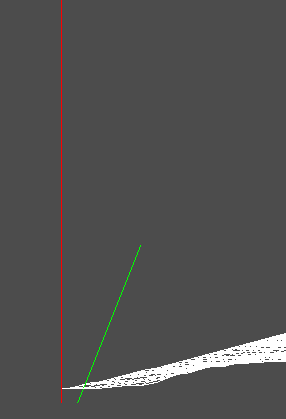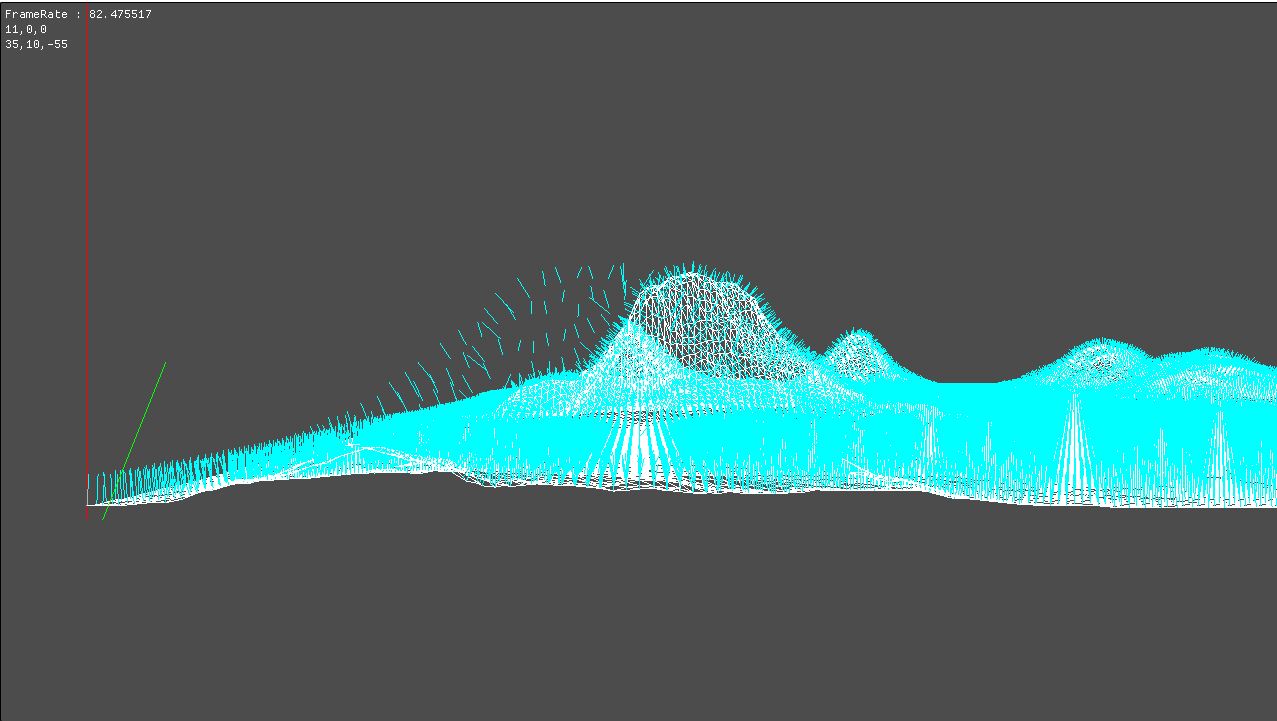Debug Log
디버깅을 위해 선을 출력하는 클래스이다. 그것 외엔 딱히 기능은 없지만, 있으면 정말 편한 기능이다.
Terrain.cpp
void Terrain::CreateNormalData()
{
for (UINT i = 0; i < indexCount / 3; i++)
{
UINT index0 = indices[i * 3 + 0];
UINT index1 = indices[i * 3 + 1];
UINT index2 = indices[i * 3 + 2];
TerrainVertex v0 = vertices[index0];
TerrainVertex v1 = vertices[index1];
TerrainVertex v2 = vertices[index2];
Vector3 a = v1.Position - v0.Position;
Vector3 b = v2.Position - v0.Position;
Vector3 normal;
D3DXVec3Cross(&normal, &a, &b);
vertices[index0].Normal += normal;
vertices[index1].Normal += normal;
vertices[index2].Normal += normal;
}
for (UINT i = 0; i < vertexCount; i++)
{
D3DXVec3Normalize(&vertices[i].Normal, &vertices[i].Normal);
}
}
각 정점의 외적 정규 벡터를 구하는 함수다.
정점마다 외적을 계산하고 평균을 내면 되지만, 그렇게 하면 각 정점마다 몇개의 값이 더해져 몇으로 나눠야 하는지 정확하게 알려면 다른 변수를 넣어 메모리를 더 써야 하지만, 외적을 정규화 시키면 평균과 유사한 값이 나오기 때문에 각 정규화를 더했다.
각 IndexBuffer에 있는 정점으로 구해준다.
DebugLog.h
#pragma once
#define MAX_DEBUG_LINE 150000
class DebugLine
{
public:
friend class Window;
static DebugLine* Get();
private:
static void Create();
static void Delete();
public:
void RenderLine(const Vector3& start, const Vector3& end);
void RenderLine(const Vector3& start, const Vector3& end, float r, float g, float b);
void RenderLine(const Vector3& start, const Vector3& end, const Color& color);
void RenderLine(float x, float y, float z, float x2, float y2, float z2);
void RenderLine(float x, float y, float z, float x2, float y2, float z2, float r, float g, float b);
void RenderLine(float x, float y, float z, float x2, float y2, float z2, const Color& color);
private:
void Update();
void Render();
private:
DebugLine();
~DebugLine();
private:
static DebugLine* instance;
private:
Shader* shader;
Matrix world;
ID3D11Buffer* vertexBuffer;
VertexColor* vertices;
UINT drawCount = 0;
};
싱글톤 클래스로 만들었으며, 자세한건 cpp에서 설명
DebugLog.cpp
void DebugLine::Update()
{
Matrix world;
D3DXMatrixIdentity(&world);
shader->AsMatrix("World")->SetMatrix(world);
shader->AsMatrix("View")->SetMatrix(Context::Get()->View());
shader->AsMatrix("Projection")->SetMatrix(Context::Get()->Projection());
}
void DebugLine::Render()
{
if (drawCount < 1)
{
return;
}
D3D::GetDC()->UpdateSubresource(vertexBuffer, 0, nullptr, vertices, sizeof(VertexColor) * drawCount, 0);
UINT stride = sizeof(VertexColor);
UINT offset = 0;
D3D::GetDC()->IASetPrimitiveTopology(D3D11_PRIMITIVE_TOPOLOGY_LINELIST);
D3D::GetDC()->IASetVertexBuffers(0, 1, &vertexBuffer, &stride, &offset);
shader->Draw(0, 0, drawCount);
drawCount = 0;
ZeroMemory(vertices, sizeof(VertexColor) * MAX_DEBUG_LINE);
}
업데이트와 렌더링 부분이다.
각 선들은 VertexColor로 되어있기 때문에 모든 사이즌s VertexColor로 크기를 만들어준다.
void DebugLine::RenderLine(const Vector3 & start, const Vector3 & end, const Color & color)
{
// 짝 start
vertices[drawCount].Color = color;
vertices[drawCount++].Position = start;
// 홀 end
vertices[drawCount].Color = color;
vertices[drawCount++].Position = end;
}
start 에서 end까지 라인을 그어준다.
DebugLine::DebugLine()
{
shader = new Shader(L"20_DebugLine.fx");
vertices = new VertexColor[MAX_DEBUG_LINE];
ZeroMemory(vertices, sizeof(VertexColor) * MAX_DEBUG_LINE);
// Create Vertex Buffer
{
D3D11_BUFFER_DESC desc;
ZeroMemory(&desc, sizeof(D3D11_BUFFER_DESC));
desc.ByteWidth = sizeof(VertexColor) * MAX_DEBUG_LINE;
desc.BindFlags = D3D11_BIND_VERTEX_BUFFER;
// GPU 복사 부분
D3D11_SUBRESOURCE_DATA subResource = { 0 };
subResource.pSysMem = vertices;
Check(D3D::GetDevice()->CreateBuffer(&desc, &subResource, &vertexBuffer));
}
D3DXMatrixIdentity(&world);
}
생성자이다.
최대 Vertex만큼 크기를 정해준다.
이 상태로 Window 부분에 Render()와 Update() 에 넣어준다.
그리고 이 상태로 싱글톤을 사용해서 그어주면
DebugLine::Get()->RenderLine(0, 0, 0, 0, 100, 0, Color(1,0,0,1));
DebugLine::Get()->RenderLine(1, 0, 0, 5, 10, 0, Color(0,1,0,1));

그러면 VertexCount만큼 그어주면
for(UINT i = 0; i < vertexCount; i++)
{
Vector3 start = vertices[i].Position;
Vector3 end = vertices[i].Position + vertices[i].Normal * 2;
DebugLine::Get()->RenderLine(start, end, Color(0, 1, 1, 1));
}
굉장히 많은 Vertex와 Line을 렌더링 하기 때문에 프레임이 저하되는것을 볼 수 있다.(모발이 굉장히 많다… 부럽다…)
